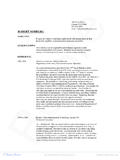Transcription of 1 Me Before You - Welcome to the Hunterdon County Library
1 1 me before you By Jojo Moyes Publication Date: December 31, 2012 Genres: Fiction, Romance Hardcover: 384 pages Publisher: Pamela Dorman Books ISBN-13: 9780670026609 About the Book They had nothing in common until love gave them everything to lose Louisa Clark is an ordinary girl living an exceedingly ordinary life --- steady boyfriend, close family --- who has never been farther afield than their tiny village. She takes a badly needed job working for ex Master of the Universe Will Traynor, who is wheelchair bound after an accident. Will has always lived a huge life --- big deals, extreme sports, worldwide travel --- and now he s pretty sure he cannot live the way he is. Will is acerbic, moody, bossy --- but Lou refuses to treat him with kid gloves, and soon his happiness means more to her than she expected. When she learns that Will has shocking plans of his own, she sets out to show him that life is still worth living.
2 A Love Story for this generation, ME Before YOU brings to life two people who couldn t have less in common --- a heartbreakingly romantic novel that asks, What do you do when making the person you love happy also means breaking your own heart? Discussion Questions 1. If you were Louisa, would you have quit working for the Traynors? If yes, at what point? 2. Were you able to relate to the way Will felt after his accident? What about his outlook on life did you find most difficult to understand or accept? 3. Discuss the meaning of the novel s title. To whom do the me and you refer? 4. Louisa often finds Mrs. Traynor cold and judgmental. Is there an appropriate way to behave in Mrs. Traynor s situation? 2 5. What is your opinion of Mr. Traynor? Did it change after you read his side of the story? 6. Why is Louisa able to reach Will when so many others could not? 7. Were you as surprised as Lou to learn of Will s plans?
3 8. Compare Louisa s relationship with Treena to Will s relationship with Georgina. Do siblings know one another any better simply because they are related? 9. Would Patrick have asked Louisa to move in with him if he hadn t felt threatened by Will? If Louisa had never accepted her job with the Traynors, where would her relationship with Patrick have gone? 10. Discuss Louisa s own secret ties to the castle. Would most girls in her situation have blamed themselves? Should Treena have behaved differently in the aftermath? 11. What did you make of the way Lou s mother, Josie, judges Lou s decisions regarding Will. Is Josie s reaction fair? 12. Before his accident, Will was a philanderer and a corporate raider who would probably never have given Louisa a second look. Why is it that people are so often unable to see what s truly important until they ve experienced loss? Interview with Jojo Moyes July, 2013 | As taken from Although English author Jojo Moyes bid the high-octane world of hard-news reporting good-bye for a quieter life writing novels, she brings a similar sense of timeliness to her best-selling work.
4 In her 2012 groundbreaking novel, Me Before You, Moyes crafted a swoon-worthy love affair between a quadriplegic and his caretaker, and also touched on the issue of the right to die. Her book The Ship of Brides pumped life into a historical era as it followed a group of young women traveling to England to meet up with the men they married by proxy during World War II. Now her latest novel, number 12, is The Girl You Left Behind. Coupling a dangerous and complicated attraction between French Sophie and the German Kommandant during World War I with a modern-day story of a young woman struggling to get over the death of her famed architect husband, Moyes manages to bring in the issues of war reparations, enemy lines, and class differences, all in one joyful human package. She chats with Goodreads about getting her writing done with three kids, how she hopes her books remind people to live their life without regrets, and the difficulties she faces as she searches for more roadblocks 3 to keep aspiring lovers apart.
5 Interplanetary romance may be next! Goodreads: You began your career as a journalist and then switched to fiction after writing for ten years for The Independent. What led you to that decision? Jojo Moyes: I'd always wanted to write a book, but it was after I had my first child. I'd been a news reporter, and I realized that I couldn't be that and have a small baby. I'd done really quite an exciting job of writing about Northern Ireland and the death of Princess Diana. I used to travel with my passport in my handbag. Suddenly I realized that that just wasn't going to happen anymore. So I started working on a novel around my working hours. Now I look back and I can't imagine how I had the energy to do that alongside the newspaper. I was younger then. GR: So you had a newborn, you were working at the newspaper, and you were also writing a novel at the same time? JM: I look back and think it was insanity, but I have a very understanding husband.
6 I wrote three books, one after the other, each of which got rejected. Number 4, which was my last go because by then I was pregnant with my second child and I thought, "I can't keep doing this." I wrote three chapters of book 4, and there was an auction and six publishers bid for it. GR: So in your latest work, The Girl You Left Behind, why did you choose to juxtapose World War I with the modern day in your novel? JM: I felt that I'd read an awful lot of books set in World War II, and I wasn't sure I could bring anything fresh to it. I saw a couple of documentaries over here about the life of ordinary people in World War I. One of the things I discovered was that I hadn't realized how extensive the German occupation of France was. It was really shocking to me and kind of moving. It made me want to write about that period. The level of obsession with food, for example, and the fact that Germans could just come into your house and demand anything that they wanted.
7 I couldn't imagine what that would be like. GR: Was it particularly difficult to gather information about that era since there are no longer any survivors? JM: Yes, it was. Usually when I research, I go to primary source material as much as possible. I wrote a book called The Ship of Brides, and I went and spent time on an aircraft carrier. When I write about horses in The Horse Dancer, I went to France to look at Le Cadre Noir, which is an ancient riding academy. What I found was, that aside from this book and some other archives, a lot of the information about life in France under the occupation was actually destroyed due to the expansive nature of the bombing in World War I. Huge swaths of France were just completely destroyed. I found some wonderful photographic archives, which were great. The Internet makes things so much easier because people are 4 uploading their archives and information all the time.
8 I relied very heavily on that. Then I did some research in France. I did a bit of touring of museums devoted to World War I in the north of the country. GR: In The Girl You Left Behind the French female character Sophie has an attraction to the German Kommandant who is currently occupying her town. Why was the idea of creating this dangerous dynamic the allure of the enemy interesting to you as a writer? Love affairs are never cut and dried. JM: To me, that's always what makes a really interesting story. I love the tension between what should happen and what does happen. The thing that always interests me when I'm writing a story is people doing the wrong things for the right reasons. I like having a dilemma that you can put yourself into. What Sophie is faced with is if you do the wrong thing with this man, you may well win your husband his life. That's a tough decision to have to make, especially if it might cost you your husband.
9 If you can introduce a dilemma that the reader can insert himself or herself into, then it almost doesn't matter what period you write in because you can carry the reader with you. GR: The German Kommandant is one of the most vivid characters in this book. What made him such a real character for you? JM: With him it's all about control. I think in another world, him and Sophie would have been friends. I think she would have quite liked him. But he is in this impossible position where at one level he's a man that's been separated from his wife for a very long time, and he recognizes a kindred spirit. On the other hand, as complex as most people are, you have a soldier who will shoot a man if he's going outside the rules. What I wanted was someone you couldn't quite get a measure of. Most people are like that. We all don't fit in as good or bad or predictable. I wanted that tension of wondering what way their relationship was going to go.
10 That feeling that you might be playing with fire and you weren't sure if he was going to be a good guy or a bad guy. I think ultimately, he's probably a mixture of both. GR: In your previous novels, as well as this one, you seem to be comfortable taking class differences and putting them right next to each other. Many of your characters are quite sharply drawn from different worlds. Liv is a former wife of a famous architect, Sophie is a waitress, Will is an upper-crust type, and Louise lives at home and supports her parents. Is that an interest of yours? Why do you think that is? JM: Yeah, I guess I am. In England we're exposed to it all the time. It's only when you go to another country, perhaps like America or Australia, that you realize how hidebound we are in England by class and how quickly we make judgments about things as random as somebody's shoes or where they went to school.










